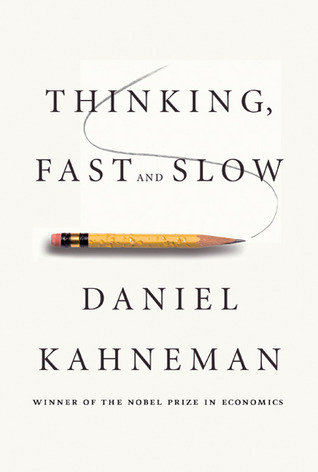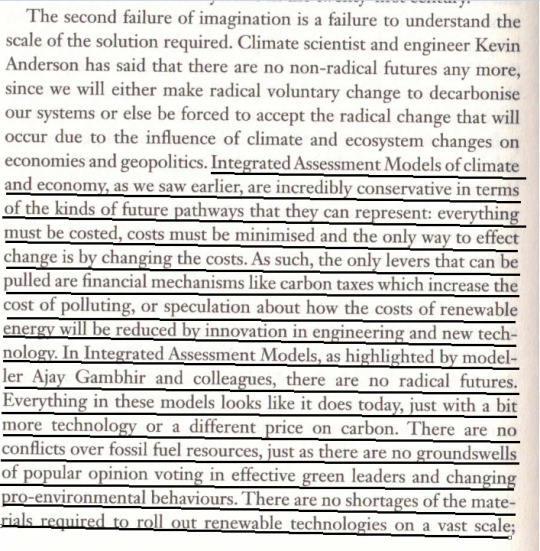#behavioural economics
Text
Book of the Day -
Today’s Book of the Day is Thinking, Fast and Slow, written by Daniel Kahneman in 2013 and published by Farrar, Straus and Giroux.
Daniel Kahneman is an Israeli-American psychologist whose main research topics have been the psychology of judgment and decision-making, and behavioural economics, for which he was awarded the 2002 Nobel Memorial Prize in Economic Sciences (shared with Vernon L.…

View On WordPress
#availability heuristic#behavioural economics#behavioural psychology#Book Of The Day#book recommendation#book review#bookstagram#booktok#cognitive bias#cognitive science#Daniel Kahneman#decision-making#Economics#endowment effect#loss aversion#Neuroscience#prospect theory#Psychology#Raffaello Palandri
12 notes
·
View notes
Text
Making a distinction upfront changes the way a situation occurs to you...
A short dedication to Professor Govindrajan who changed the way I experienced my management education...
June 2000. Humanity has survived the millennium bug. The 4th term at XIM Bhubaneshwar has just begun. Bang in the middle of the Orissa summer, a Business Management elective is scheduled at 3:00 in the afternoon. The elective is over subscribed largely based on the reputation of the Professor teaching the course.
I arrive in the classroom 10 minutes ahead of time. Prof. G is already seated at a…

View On WordPress
2 notes
·
View notes
Text


cannot believe i started studying for this exam literally the night before. why am i like this.
anyway. behavioural economics are cool and epic and fun to take notes about.
#studyblr#dark academia#gay academia#chaotic academia#aesthetics#lamy#muji pens#english major#behavioural economics#economics student#studyffocation
12 notes
·
View notes
Text
“Hypermania” and the Decision-Making Fatigue
Aren't you tired of "hyper-everything"?
By Mr. Maverick,
Our daily lives constitute an ever-ending decision making process. I made a calculated decision to invest some time and communicate my thoughts through this article – and you, dear reader, made another (well-?)calculated decision to take some time out of your busy schedule and read this article which you probably found intriguing. From deciding what to wear and buying that extra…

View On WordPress
0 notes
Quote
Power of defaults: Research shows that people are more likely to stick to the default choice. For example, in countries where the default is for people to not be organ donors only 15% of people opt in. When the default is for people to be organ donors only 10% of people opt out.
Status quo bias: People have a strong tendency to maintain the current state of affairs. For example, many drivers stick with their current car insurers as they are already familiar with the service despite other providers offering better products and/or prices.
Framing: The same choice framed in different ways results in different decisions. For example, “If you have the operation you have a 90% chance of surviving 5 years” results in more people opting for procedures than when the framing is, “You have a 10% chance of passing away within 5 years.”
Anchoring and adjustment: When asked to make an estimate, we start with a number we know and adjust up or down from there. For example, someone from Chicago may guess the population of Milwaukee by starting with that of Chicago (~3m) and adjusting down to, say 1m. Someone from Green Bay may adjust up from their population (100k) to, say, 300k.
Yeah, whatever heuristic: In low-stakes decision making, many people will choose whatever option is presented to them. For example, a TV viewer who starts the evening watching NBC is likely to stay there despite the switching cost being only one button click.
Conformity: In a group context, our decisions are influenced by those that others make. For example, in a meeting if the majority of people express a certain opinion, the remaining attendees have an increased likelihood of following suit.
Mere-measurement effect: People asked what they intend to do become more likely to act in accordance with their answers. For example, if people are asked whether they intend to eat certain foods, to diet, or to exercise, their answers to the questions will affect their behavior.
Cass Sunstein and Richard Thaler, Nudge — Alex Murrell
The seven nudges
0 notes
Text
{ JayCee HaLLows } I-A
For August 25 2022
Dr Jennifer J B Nyhof
Machine Learning | AI | Search Engine Optimization [SEO] | Behavioural Economics | NLP
Machine Learning | AI | Search Engine Optimization | JayCee HaLLows
Copyright © 2007 - 2022. JayCeeHaLLows.com

View On WordPress
#ai#AOVI technology#behavioural economics#JayCee HaLLows#machine Learning#Neuro-Linguistic Programming#Neurolinguistics#NLP#ONE reality#search engine optimization#seo#the new normal
0 notes
Text
Meetings - who needs them!?
Meetings – who needs them!?
Really love this concept by professors Don A. Moore and Max H. Bazerman as outlined in their new book, Decision Leadership.
“Often the group can make a better decision without meeting to discuss: simply average everyone’s ratings of the options and choose the option with the highest ratings.”
Now that’s a meeting I’d attend!!
[Put my hands up here and say that I have not read their book yet,…

View On WordPress
#futureoflawthought#readfirstlegal#behavioural economics#decision leadership#decision trees#Don A. Moore#Max H. Bazerman#meetings
0 notes
Text


Erica Thompson, Escape from Model Land: How Mathematical Models Can Lead Us Astray and What We Can Do About It (2022)
#see also how pandemic modelling completely failed to account for social behaviour#climate change#mathematics#climate modelling#science#global warming#erica thompson#escape from model land#economics
199 notes
·
View notes
Text
The thing with conceptualizing what Aubergine does and why is I always have to take 5 steps back and remind myself that he fundamentally is a guy who sucks.
He’s a guy who is a little incapable of considering other people as being real and is ambivalent towards changing that. He just also happens to have an inexplicable draw where people want to be in his inner circle so bad because once you’re part of his hoard he’ll go to any distance for you. Does he consider you real? No not really still, it is very much a possessive instinct but alas his easygoing medium meangirl demeanour and in-group slay have made the red flags look more festive
#like if he likes you enough he will change his behaviour for you but you just knowwww he hasn’t changed his thinking on the matter#unfortunately the only people he liked enough to change his behaviour for are the type of people to go ‘well at least he’s trying’ or#the type to not care#GOD he sucks so much#points ‘software engineering & managment with a minor in economics!’#it’s the reason why he doesn’t see any issues dating around the friend group and fucking everyone involved (except himself) up btw#and unfortunately his care for the people around him and genuine not understanding that his behaviour could’ve hurt people has the#incredibly traumatized people in his life going ‘well you can’t help but love him’ like KILL HIM#aubergine kai
6 notes
·
View notes
Text
Book of the Day -
Today’s Book of the Day is Atomic Habits, written by James Clear in 2018 and published by Random House Business.
James Clear is one of the world’s most renowned writers and speakers about habits, decision-making, and continuous improvement. He is a regular speaker at Fortune 500 companies and his work has been featured in places like Time magazine, the New York Times, and the Wall Street…

View On WordPress
#behavioural economics#Book#Book Of The Day#book recommendation#book review#bookstagram#booktok#continuing growth#personal growth#Raffaello Palandri
6 notes
·
View notes
Text
The main example of how the mass thinking nowadays is UScentric and unfiltered from context is the age discourse. The whole boomer thing.
#when i was younger i was so angry with boomers but recognising them as parents screwing up their kids mostly so i was biased#after years i realised that people talked less about generational behaviour and more about privilege and status and systematic(word that#screams American)power and there is the failure. most post war countries experienced an economic boom but#besides the us the great majority of boomers grew up in poverty and neglect and had to fight for basic rights#then things became a little easier for them especially in the 80s and 90s when they were already 30/40. I'm not taking away their faults#they're the 68 gen the sex liberation the drugs the fashion and now the majority is hella conservative(zoomers future except the efforts)#but they never were given stuff on silver platters nor were rich and privileged for the most part and even in rich countries#this make people forget about how gen x are entitled and in power now and ruined many things with no consequences. karens are genX bc they#know how to cater to younger people and turn them against the elders while using rainbow slogans for their major companies#then there's the whole young people are innocent/age gaps in love are bad/my grandma had 2 houses at 20 she robbed me#my grandma had to almost die to buy the house I live in now that she left me or else I'd be homeless and age discourse is generalised ik#but still very not focused on what is really the fault and instead on envy and minor context.
2 notes
·
View notes
Text
omg i figured out why the guy in my chinese literature class gives me bad vibes every time we talk he notices something about me and acts like it's weird!!! "why are you printing the readings on graph paper" (i have a hundred pages leftover from school might as well use them) "why are you even taking this class" (cause i'm in sociology i guess) "wow it's the first time we see your face!" ( the week i was sick happened to cover class 2&3 i wasn't even wearing a mask on class 1. like what) guy's doing an east asian studies minor like half the people in there aren't going to be weeb weirdoes!! he's gotta get used to meeting freaks
#we just happen to sit near each other so we do most of the discussions together orz#on the brain#i don't even think printing on graph paper is freak behaviour it's just economical#or taking a class outside of your major. or wearing a mask when you're sick
6 notes
·
View notes
Quote
Unhelpful unclepan is probably an upper-caste affliction but it does not necessarily have a gender or age group. Many of the domineering behaviours described by the women I interviewed were displayed by young men. Years of socialisation in patriarchy, self-doubt, age-based deference, and internalising a feudal structure that props up upper-caste privilege and pits women against each other for men’s affections, implies women are as likely to display the bigoted traits of uncledom as men. Many prominent supporters of abusive men’s rights groups are female. The corollary is that not all middle-aged men are unhelpful uncles. The biggest victims of unhelpful uncles are men they raise as sons or nurture as mentees at the workplace. One of the most moving pieces of media content churned out in 2022 was a brutally honest conversation on modern masculinity between podcaster Amit Varma and mental health activist Nikhil Taneja. Taneja highlighted how middle-class homes and institutions in India raise boys to believe that competitive achievement can singularly confer affection. Such a belief system invariably leads to lonely, angry and mentally unwell men. The fact is that the traits of an unhelpful uncle lurk in each one of us in positions of any power and economic privilege. Before we point fingers and outrage at others, defeating the pandemic of pettiness in our economy and polity will require us to defeat the tyranny of the insecure uncle within ourselves.
Sharanya Bhattacharya, ‘The tyranny of the Indian uncle’, Mint
#Mint#Sharanya Bhattacharya#India#Indian Uncle#casteism#domineering behaviours#patriarchy#self-doubt#age-based deference#feudalism#upper-caste privilege#bigotry#modern masculinity#Amit Varma#Nikhil Taneja#affection#competitive achievement#middle-class#power#economic privilege#pettiness#tyranny
4 notes
·
View notes
Text
pretending to be an avatar of the eye so i can motivate myself to study for an exam
#its economics so this behaviour is totally acceptable in such extreme cases#tma#the magnus archives
6 notes
·
View notes
Text
social behavioural sciences student regulus black. thanks for listening.
#is this projection? very much so#in an au where he studies whatever he wants he might go for something very theoretical#and something that borders the humanities more than the social sciences#in an au where he’s still tied to his family I think he’d study economics (ppe too maybe) bc it sounds acceptable enough for his family and#he finds interesting enough to go through with it#tho I think that when he’s older he’d be less ‘I do what my family wants me to do’ and he’d stay in academia bc research is his thing#im a business bro regulus DENIER so I see him doing economics for the theory aspect of it really#all very academic all very research-y all very theoretical#*whisper* maybe behavioural economics#regulus just screams social sciences to me and i think he might enjoy the tiny aspect of behavioural sciences that’s a bit manipulative
3 notes
·
View notes
Text
.
#I have a business for lawyers exam today#and honestly?????#business is so easy PLEASE#so embarrassing for business bros#like this is your grind??#literally I feel like it’s mostly common sense#very much in my girlboss gatekeep game theory era#behavioural economics is really interesting though I might take it next semester
2 notes
·
View notes